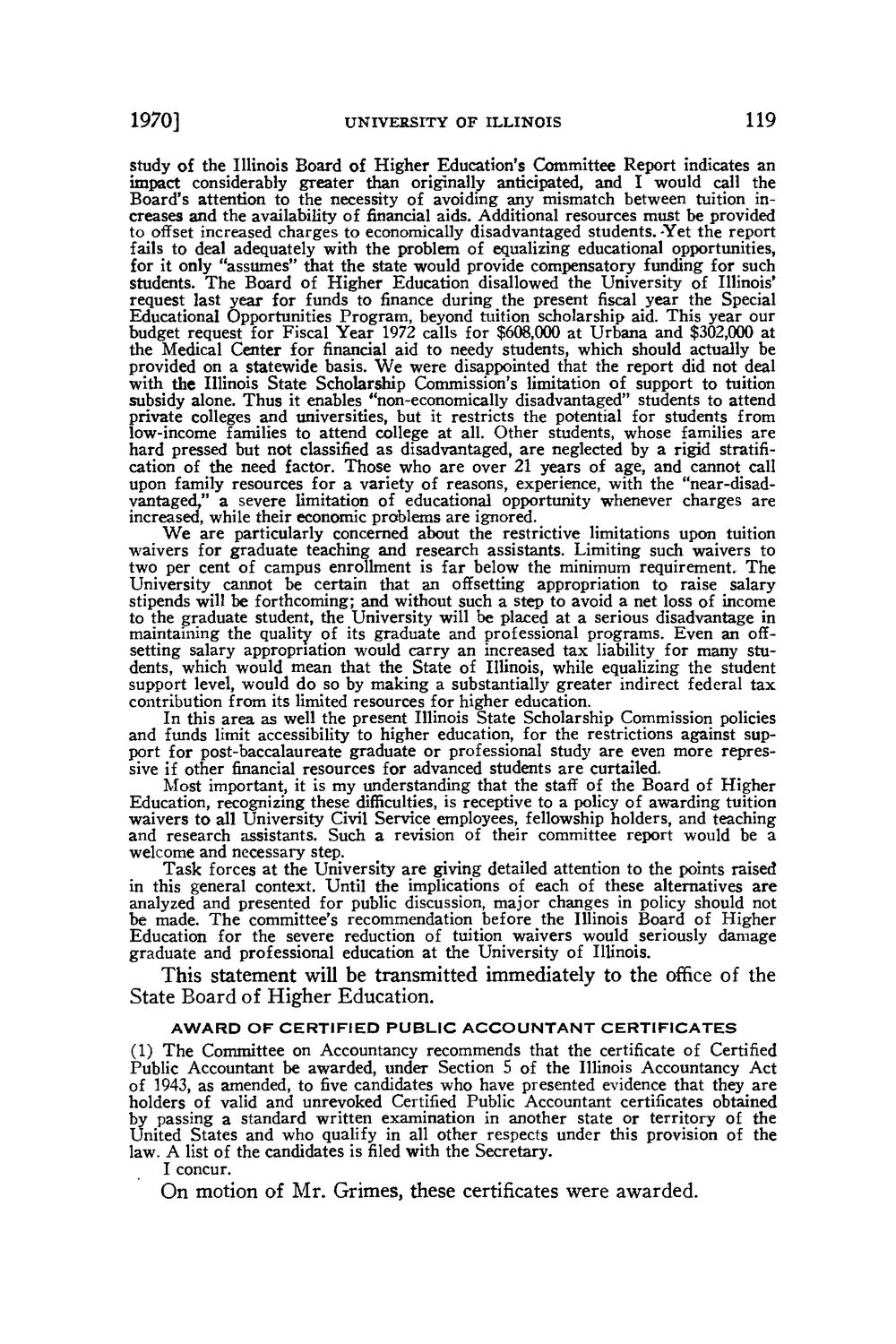| |
| |
Caption: Board of Trustees Minutes - 1972
This is a reduced-resolution page image for fast online browsing.

EXTRACTED TEXT FROM PAGE:
1970] UNIVERSITY OF ILLINOIS 119 study of the Illinois Board of Higher Education's Committee Report indicates an impact considerably greater than originally anticipated, and I would call the Board's attention to the necessity of avoiding any mismatch between tuition increases and the availability of financial aids. Additional resources must be provided to offset increased charges to economically disadvantaged students. -Yet the report fails to deal adequately with the problem of equalizing educational opportunities, for it only "assumes" that the state would provide compensatory funding for such students. The Board of Higher Education disallowed the University of Illinois' request last year for funds to finance during the present fiscal year the Special Educational Opportunities Program, beyond tuition scholarship aid. This year our budget request for Fiscal Year 1972 calls for $608,000 at Urbana and $302,000 at the Medical Center for financial aid to needy students, which should actually be provided on a statewide basis. We were disappointed that the report did not deal with the Illinois State Scholarship Commission's limitation of support to tuition subsidy alone. Thus it enables "non-economically disadvantaged" students to attend private colleges and universities, but it restricts the potential for students from low-income families to attend college at all. Other students, whose families are hard pressed but not classified as disadvantaged, are neglected by a rigid stratification of the need factor. Those who are over 21 years of age, and cannot call upon family resources for a variety of reasons, experience, with the "near-disadvantaged," a severe limitation of educational opportunity whenever charges are increased, while their economic problems are ignored. We are particularly concerned about the restrictive limitations upon tuition waivers for graduate teaching and research assistants. Limiting such waivers to two per cent of campus enrollment is far below the minimum requirement. The University cannot be certain that an offsetting appropriation to raise salary stipends will be forthcoming; and without such a step to avoid a net loss of income to the graduate student, the University will be placed at a serious disadvantage in maintaining the quality of its graduate and professional programs. Even an offsetting salary appropriation would carry an increased tax liability for many students, which would mean that the State of Illinois, while equalizing the student support level, would do so by making a substantially greater indirect federal tax contribution from its limited resources for higher education. In this area as well the present Illinois State Scholarship Commission policies and funds limit accessibility to higher education, for the restrictions against support for post-baccalaureate graduate or professional study are even more repressive if other financial resources for advanced students are curtailed. Most important, it is my understanding that the staff of the Board of Higher Education, recognizing these difficulties, is receptive to a policy of awarding tuition waivers to all University Civil Service employees, fellowship holders, and teaching and research assistants. Such a revision of their committee report would be a welcome and necessary step. Task forces at the University are giving detailed attention to the points raised in this general context. Until the implications of each of these alternatives are analyzed and presented for public discussion, major changes in policy should not be made. The committee's recommendation before the Illinois Board of Higher Education for the severe reduction of tuition waivers would seriously damage graduate and professional education at the University of Illinois. This statement will be transmitted immediately to the office of the State Board of Higher Education. AWARD OF CERTIFIED PUBLIC ACCOUNTANT CERTIFICATES (1) The Committee on Accountancy recommends that the certificate of Certified Public Accountant be awarded, under Section 5 of the Illinois Accountancy Act of 1943, as amended, to five candidates who have presented evidence that they are holders of valid and unrevoked Certified Public Accountant certificates obtained by passing a standard written examination in another state or territory of the United States and who qualify in all other respects under this provision of the law. A list of the candidates is filed with the Secretary. I concur. On motion of Mr. Grimes, these certificates were awarded.
| |